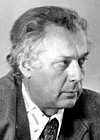
Sergey Soloviev's heart stopped beating on 9 March 1994. His death brought to an end the career of a man who, for almost 40 years, was a great scientific contributor to the development of seismology and tsunami research, who gained worldwide recognition as an authority in these fields and who was a courageous advocate of the principles of international co-operation.
Academician Soloviev was born in 1930 in the ancient Russian town of Novgorod. In 1956, he took a PhD degree at the University under Prof. Savarenskii and published a thesis on earthquakes which became a classic, "Classification of Earthquakes in the Soviet Union on the Basis of Energy Characteristics". After receiving his PhD, Soloviev started to work at the Geophysical Institute of the Academy of Sciences of the USSR. During this period, he edited a book summarising the efforts of Soviet scientists, "Atlas of Earthquakes in the Soviet Union", and gave a review of seismic events for the territory of the Soviet Union from the middle of the XIX Century until 1960. In 1961, he was moved from Moscow to Sakhalin where he worked until 1977 at the Sakhalin Scientific Research Institute (SSRI), starting as the Head of Seismology and departing as the Director of the Institute. In 1974, he wrote an influential paper, "The Catalogue of Tsunamis in the Pacific Ocean from Historical Events until 1974", which marked the beginning of a series of tsunami catalogues published by various parts of the Pacific and adjacent seas by different countries. During his work at the Institute, he promoted the dramatic improvement of the tsunami service and developed many innovative programmes which were recognised in his country and internationally for their quality and scope. He exercised his leadership with fairness, good taste and courage. On the basis of the SSRI, he established the Marine Geology-Geophysical Institute with 3 research vessels that, during the years of his directorship, became the backbone of international ocean activities in the region. He was elected President of the IUGG Tsunami Commission in 1971 and occupied this post until 1979.
In 1977, Soloviev's poor health made him abandon his post in Sakhalin and move to Moscow where, from 1978 until the last days of his life, he headed the laboratory of seismology at the Institute of Oceanology of the Russian Academy of Sciences. During his tenure at the laboratory, Soloviev extended his areas of interest into contributing to the creation of an original bottom-mounted instrument package which could pop up when needed. These systems were widely used for seismological research in different ocean areas: Mediterranean Sea, Laptev Sea, Atlantic Ocean. Bottom station development and different experiments carried out under the leadership of Soloviev, made it possible to explore different aspects of the earthquake problem and laid the basis of the new scientific field of marine seismology.
During the 1980's, Soloviev continued to pursue his interests in tsunami research and until the last days of life he was working on the "Catalogue of the Tsunamis in the Mediterranean Sea", which has since been completed and is now ready for publication. The publication of this Catalogue by international organisations will be the best remembrance of Soloviev and recognition of his input to world science.
Soloviev's professional development, from the 1950' to the 1990's, resulted in many publications devoted to the problems of tsunami and earthquake research. His scientific heritage includes more than 500 publications including 10 books, some of which translated into English. It was in recognition of his many years of scientific work and of his human qualities that he was elected in 1991 a full member of the Russian Academy of Sciences.
Soloviev's scientific contributions are enough to put him on the list of leading tsunami and earthquake researchers but what was always surprising was his readiness to collaborate, his generosity to share his original ideas, his understanding of human conditions and his sense of humor. We are grateful to him for his dedication and commitment and for the initiative and leadership he displayed in strengthening tsunami and seismological research. We will miss his diligence, professionalism and his personality.
Youri Oliounine and Stefano Tinti